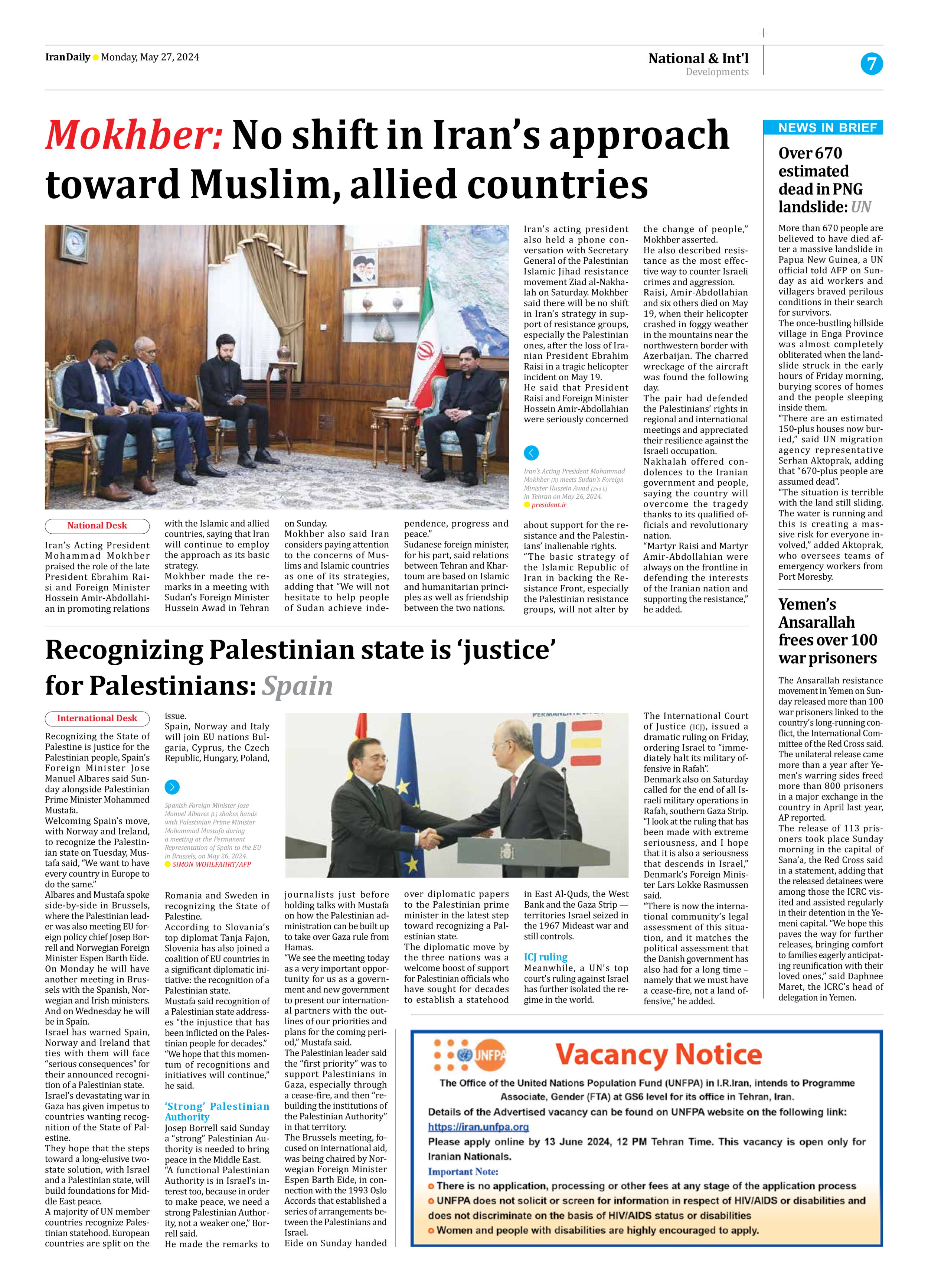
Recognizing Palestinian state is ‘justice’ for Palestinians: Spain
Recognizing the State of Palestine is justice for the Palestinian people, Spain’s Foreign Minister Jose Manuel Albares said Sunday alongside Palestinian Prime Minister Mohammed Mustafa.
Welcoming Spain’s move, with Norway and Ireland, to recognize the Palestinian state on Tuesday, Mustafa said, “We want to have every country in Europe to do the same.”
Albares and Mustafa spoke side-by-side in Brussels, where the Palestinian leader was also meeting EU foreign policy chief Josep Borrell and Norwegian Foreign Minister Espen Barth Eide.
On Monday he will have another meeting in Brussels with the Spanish, Norwegian and Irish ministers. And on Wednesday he will be in Spain.
Israel has warned Spain, Norway and Ireland that ties with them will face “serious consequences” for their announced recognition of a Palestinian state.
Israel’s devastating war in Gaza has given impetus to countries wanting recognition of the State of Palestine.
They hope that the steps toward a long-elusive two-state solution, with Israel and a Palestinian state, will build foundations for Middle East peace.
A majority of UN member countries recognize Palestinian statehood. European countries are split on the issue.
Spain, Norway and Italy will join EU nations Bulgaria, Cyprus, the Czech Republic, Hungary, Poland, Romania and Sweden in recognizing the State of Palestine.
According to Slovania’s top diplomat Tanja Fajon, Slovenia has also joined a coalition of EU countries in a significant diplomatic initiative: the recognition of a Palestinian state.
Mustafa said recognition of a Palestinian state addresses “the injustice that has been inflicted on the Palestinian people for decades.”
“We hope that this momentum of recognitions and initiatives will continue,” he said.
‘Strong’ Palestinian Authority
Josep Borrell said Sunday a “strong” Palestinian Authority is needed to bring peace in the Middle East.
“A functional Palestinian Authority is in Israel’s interest too, because in order to make peace, we need a strong Palestinian Authority, not a weaker one,” Borrell said.
He made the remarks to journalists just before holding talks with Mustafa on how the Palestinian administration can be built up to take over Gaza rule from Hamas.
“We see the meeting today as a very important opportunity for us as a government and new government to present our international partners with the outlines of our priorities and plans for the coming period,” Mustafa said.
The Palestinian leader said the “first priority” was to support Palestinians in Gaza, especially through a cease-fire, and then “rebuilding the institutions of the Palestinian Authority” in that territory.
The Brussels meeting, focused on international aid, was being chaired by Norwegian Foreign Minister Espen Barth Eide, in connection with the 1993 Oslo Accords that established a series of arrangements between the Palestinians and Israel.
Eide on Sunday handed over diplomatic papers to the Palestinian prime minister in the latest step toward recognizing a Palestinian state.
The diplomatic move by the three nations was a welcome boost of support for Palestinian officials who have sought for decades to establish a statehood in East Al-Quds, the West Bank and the Gaza Strip — territories Israel seized in the 1967 Mideast war and still controls.
ICJ ruling
Meanwhile, a UN’s top court’s ruling against Israel has further isolated the regime in the world.
The International Court of Justice (ICJ), issued a dramatic ruling on Friday, ordering Israel to “immediately halt its military offensive in Rafah”.
Denmark also on Saturday called for the end of all Israeli military operations in Rafah, southern Gaza Strip.
“I look at the ruling that has been made with extreme seriousness, and I hope that it is also a seriousness that descends in Israel,” Denmark’s Foreign Minister Lars Lokke Rasmussen said.
“There is now the international community’s legal assessment of this situation, and it matches the political assessment that the Danish government has also had for a long time – namely that we must have a cease-fire, not a land offensive,” he added.







